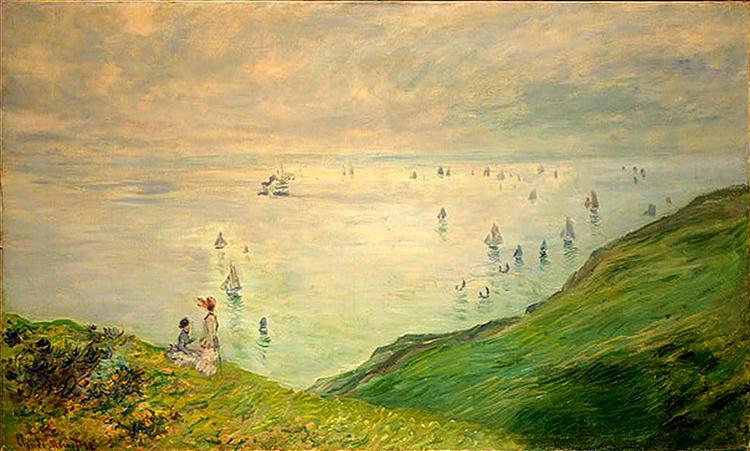Beschreibung
Walk on the Cliffs at Pourville, painted in 1882 by Claude Monet, is a work that encapsulates the essence of Impressionism, an artistic movement that Monet himself helped establish and popularize. In this evocative painting, the viewer is invited to experience the particular atmosphere of the French coastline, a recurring theme in the artist's work. The scene takes place on a cliff, with a background of gentle waves of the sea, and the sky is a canvas that transitions between shades of blue and gray, accentuated by the dynamic brushstrokes that characterize Monet's technique.
The composition focuses on two figures in the foreground, dressed in period clothing. These characters, a woman and a man, seem to be immersed in a moment of contemplation or conversation. Their posture, slightly apart from each other, suggests both the intimacy and the professional and personal space of the travelers, raising questions about their relationship and their connection with the environment around them. The figures are painted with a color palette that subtly blends with the tones of the landscape, favoring the almost magical integration of the human with nature.
The use of colour in this painting is essential. Monet employs a rich range of greens and blues, which are interrupted by the warmth of the light reflecting off the cliffs. The technique of loose, rapid brushstrokes not only captures the changing light, but also suggests a sense of movement, hinting that the landscape is alive and constantly changing. Shadows and light play a crucial role, as the work conveys the fleeting nature of a moment, something Monet would explore throughout his career. The sky, in particular, is filled with clouds suggesting impending variability, a reflection of his passion for capturing nature in its most ephemeral state.
The choice of location is also significant. Pourville, a small seaside resort in Normandy, was one of the favourite destinations of Monet and his contemporaries. This personal connection to the place is reflected in the authenticity that radiates from the work. Monet also explored other themes of coastal landscapes, such as in his famous series of the beaches of Étretat, a proximity that resonates in the painting and reflects his devotion to the transformations of light and colour of the sea.
The painter, who was first associated with the Impressionist movement, remains a central figure in art history due to his innovative approach to color and light. Walk on the Cliffs at Pourville reveals Monet's distinctive approach to the landscape: he presents it not as a static object, but as a lived experience, a testimony to the time and space in which he paints. This work is a beautiful reminder of art as a means of deep connection with nature and human emotions, capturing not only a place, but also a timeless moment in existence.
As we cast our gaze upon this landscape, it is easy to feel the coastal air, the sound of the sea crashing against the rocks, and to grasp the beauty that Monet so masterfully achieved. This walk along the cliffs is not only a physical journey, but also an invitation to immerse oneself in the beauty of the fleetingness of moments and the deepening of the human soul in dialogue with nature. Thus, Monet's work continues to influence contemporary art and reaffirms his place as an icon of Impressionism and as a master in capturing light and color.
KUADROS ©, a famous painting on your wall.
Hand-made oil painting reproductions, with the quality of professional artists and the distinctive seal of KUADROS ©.
Painting reproduction service with satisfaction guarantee. If you are not completely satisfied with the replica of your painting, we will refund 100% of your money.

